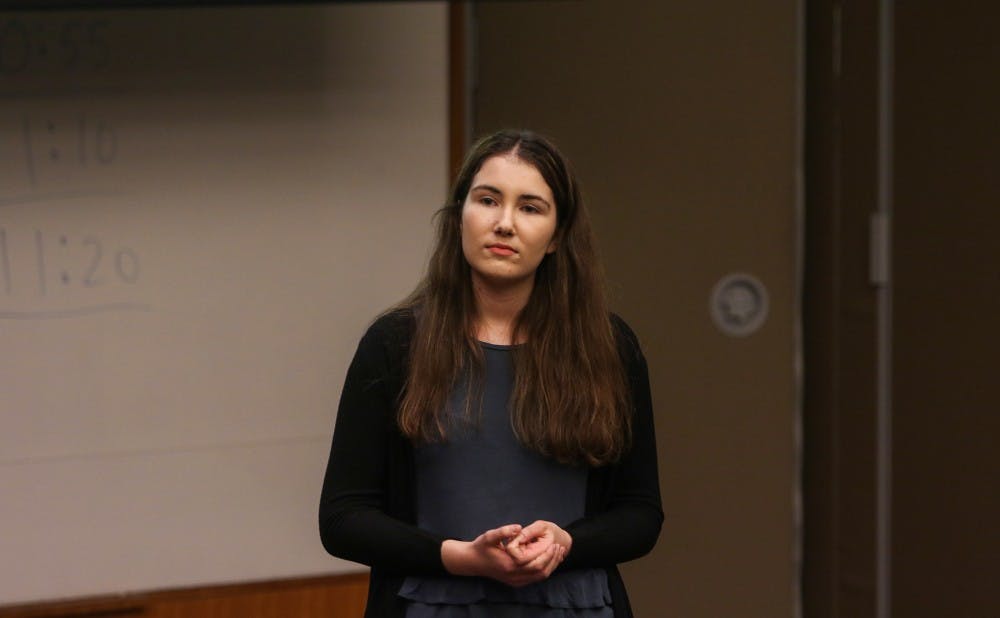The Senate had its first reading of potential changes to the DSG Constitution at Wednesday’s Duke Student Government meeting.
Associate Justice Alex Murphy, a junior, and President Pro Tempore Jackson Dellinger presented the revised Constitution. Dellinger, a junior, said the changes—which he is still reviewing alongside the Judiciary and Internal Affairs committee—focus on the overall structure, organization and wording of the current Constitution.
“For me, there are three key places within the Constitution that we will review for next week," Dellinger said. "First, is the protection of political ideology and the expansion of the Bill of Rights. The Duke community standard, the already de facto rule…. should be de jure as well. Third, a formalization of the bad standing process because right now it is whatever a person wants, which is probably not good."
Bad standing
Although attendance has improved from past years, the Senate's at-large members have been accruing unexcused absences. According to Section viii, Rule III of the House Rules, a senator with two or more unexcused absences can be placed in bad standing. As of the attendance record after Wednesday’s session, 27 at-large Senators fall within this standard.
Dellinger said the current powers prescribed to the President Pro Tempore regarding the powers of senators in bad standing are “ambiguous.” Senators in bad standing are able to vote, count toward quorum and are even equipped with the ability to “delay [the hearing process] as long as possible,” Dellinger said.
With the proposed changes to the Constitution, clause 7 under Article III, Section 6 would introduce new restrictions on senators in bad standing one of which will prevent them from counting toward quorum. But the changes would also give the senators ways to petition their status and the restrictions.
Dellinger explained that the clause “formalizes some of the unspoken rules of the process and gives structure regarding it.”
"Senators in bad standing can vote, but they may only speak with Senate’s approval, they won’t count towards quorum and an additional senate unexcused absence will be considered forfeiture of their seat,” the proposed change in the Constitution reads.
The current Constitution also dubs the President Pro Tempore with unilateral power to determine who is in bad standing. Under the proposed change, the Judiciary would share some of that authority. Dellinger said that this “creates a check on what can be implemented” and “provides nuances” to the process.
“Now it’s a hand and fist approach,” Dellinger said.
Bill of rights and protection of political ideology
Within the DSG Bill of Rights, the fifth amendment details students’ equal protection rights, and DSG is now considering adding political ideology as a new class that cannot be subject to discrimination. Dellinger explained that–under the current Constitution–actors within DSG could claim that it does not like a particular institution’s politics and deem its actions unconstitutional.
“All students have the right to equal protection under the law. No student shall be subjected to discrimination on the basis of race, ethnicity, gender identity, sex, religion, national origin, sexual orientation, disability, socioeconomic status, or political ideology; but this enumeration shall not be construed to condone other violations of equal protection,” the Constitution under review reads.
First-year Joseph Touma, senator for services and sustainability, questioned whether or not the Bill of Rights should define political ideology. Murphy responded that the Judiciary typically defers to the definition provided by Black’s Law Dictionary and provided a definition later in session. Still, none of the protected classes listed under the fifth amendment are accompanied by a definition.
Duke Community Standard
Dellinger explained that DSG “already” operates within the understanding that its actions must abide by the Duke Community Standard, but wanted it to be included as a “de jure” protection. If the group is doing something “flagrantly problematic,” it should not use its political ideology as a defense.
The proposed article on the Standard reads, "DSG shall always act in accordance with the Duke Community Standard. This obligation shall supersede anything prescribed by the governing documents.”
As each student signs the Duke Community Standard, Murphy explained that anyone “engaging in bigotry” would be a violation of the Standard.
In other business:
First-year Anna Kasradze, senator for academic affairs, was confirmed as attorney general. At the Senate’s March 1 session, Kasradze was confirmed to the Board of Elections, Senate Judiciary Committee and as the DSG Secretary. If situations arise that require Kasradze to step down from her position as senator, she affirmed that she would be willing to do so.
“On the board of elections, I experienced a really rapid learning curve because we had a very interesting case, and this really helped me clarify the role of the different parts of DSG," Kasradze said in reference to recent DSG presidential election. "For example, the [roles] of the Attorney General and the Board of Elections are to implement the rules as they exist with their current interpretations. We can’t make new interpretations even if we want to. The role of the Judiciary is to rule whether those rules are unconstitutional."
The Senate changed the status of StreetMed from recognized to chartered, chartered American Mock World Health Organization and recognized Body Banter. For programming events, the Senate allocated $2,400 to the Asian Students Association, $8,975 to Duke Statistical Science Majors Union and $2,774.38 to Momentum Dance Company.
Get The Chronicle straight to your inbox
Signup for our weekly newsletter. Cancel at any time.

Stefanie Pousoulides is The Chronicle's Investigations Editor. A senior from Akron, Ohio, Stefanie is double majoring in political science and international comparative studies and serves as a Senior Editor of The Muse Magazine, Duke's feminist magazine. She is also a former co-Editor-in-Chief of The Muse Magazine and a former reporting intern at PolitiFact in Washington, D.C.

